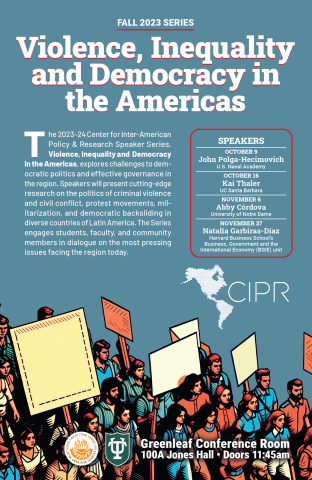
The 2023-24 Center for Inter-American Policy and Research Speaker Series: Violence, Inequality and Democracy in the Americas, explores challenges to democratic politics and effective governance in the region. Speakers will present cutting-edge research on the politics of criminal violence and civil conflict, protest movements, militarization, and democratic backsliding in diverse countries of Latin America. The Series engages students, faculty, and community members in dialogue on the most pressing issues facing the region today. This week’s talk will be given by Natalia Garbiras-Díaz from Harvard Business School’s Business, Government and International Economy (BGIE) unit on the topic “Prospective and Retrospective Approaches: Conflict Exposure and Attitudes on the Peace Agreement in Colombia”.
There is no clear consensus on the effect of exposure to conflict on attitudes towards peace agreements. For example, in Colombia, some suggest that exposure to FARC violence increases support for peace; others show that attitudes towards the peace process are not strongly correlated with conflict experiences. While most work assumes that those exposed to violent contexts use their past experiences with violence to form their attitudes toward peace agreements, we argue that people living in these regions form their opinions about the accords by weighing the future benefits that they will have access to after a peace agreement is signed. Using new survey data from a matched sample of municipalities in Colombia, we test the effects of past violence and being a potential beneficiary of the agreement on four sets of outcomes: general attitudes towards peace; provisions included in the accord that directly benefit former combatants; provisions that potentially benefit regular citizens; and the actual expected benefits. We find that previous experience with violence has almost no association with these attitudes; however, being a resident of a locality targeted by provisions that potentially provide peace dividends has a consistent and strong impact on these attitudes.
